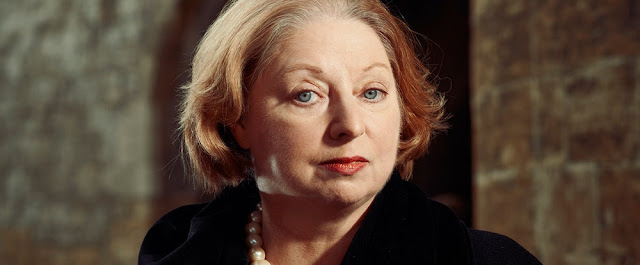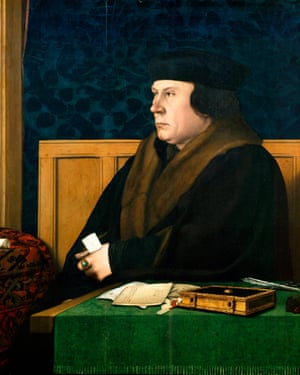 |
| Hilary Mantel |
Hilary Mantel: 'History is a process, not a locked box'
As her novel Wolf Hall is named the best of the century so far, the author looks back on the ‘long walk’ she has taken with Thomas Cromwell
Claire Armitstead
Saturday 21 September 2019
F
or years, Hilary Mantel was one of literature’s best-kept secrets, unknown to all but a devoted yet limited following. Then along came Wolf Hall. “Maybe this book will win one of the prizes that have been withheld so far,” ventured its Guardian reviewer when it was published in 2009, in what was to prove one of the understatements of the millennium. It won both the Man Booker prize and the US’s National Book Critics Circle award, selling more than 1m copies on each side of the Atlantic, and going on to colonise theatre and TV.
The second volume in the trilogy, 2011’s Bring Up the Bodies, kept the bandwagon rolling so fast and furiously that, eight years later, breathless excitement greeted the appearance of a mysterious billboard in Leicester Square in May, the first hint that the third volume was imminent. (The Mirror and the Light is out in 2020.) Mantel is phlegmatic, saying: “Some readers congratulate me on beginning a career in my 50s. I’m glad, of course, if I can offer anyone midlife encouragement. But I began writing at 22, wrote for 12 years before I published anything, and broke through in my mid-30s. I’ve had plenty of time to brace myself for success.”
 |
| Hilary Mantel |
She traces the idea of writing about Thomas Cromwell, arch manipulator of the Tudor court, back to history lessons at a Cheshire convent school in which she first learned about Henry VIII’s dissolution of the monasteries. “It seemed to me like a very good idea, and I thought I’d like to meet the man behind it.” She had already ventured into historical fiction with A Place of Greater Safety, about the French Revolution. But did she have qualms about taking on the Tudor heritage industry? “Nothing but qualms,” she says. “Think of those miles of shelves stacked with novels about Henry’s wives. But I didn’t suppose I was going to write one of those.”
Until she took him on, Cromwell was best known as the corpulent, grim-faced bureaucrat in a famous Holbein portrait. “His story hadn’t been well served by biographers or fiction writers. He was under-imagined. And when you stand where he stands, what you see defamiliarises itself,” says Mantel. “He was the man who conquers the system from within.”
Her “defamiliarisation” of the period drew criticism from some historians, in particular her refusal to go along with the sanctification of Sir Thomas More. But her response is characteristically brisk: “History is a process, not a locked box with a collection of facts inside,” she says. “The past and present are always in dialogue – there can hardly be history without revisionism. Most historians acknowledge More as a complex and conflicted human being, with debits and credits to his name. My portrait, unlike a historian’s, cannot be balanced or neutral. It comes from the imagined point of view of Cromwell, who is grievously and inextricably involved with him day by day. The same is true for my other characters; they are as I believe Cromwell sees them.”
How does she feel about finishing the trilogy after spending so long in Cromwell’s shadow? “We’ve been on a long walk, but we’re not parting company yet,” she says. A second television series has been announced, and a third stage play is likely. “Each medium offers new opportunities for the story, which is never used up, never completely told. Working on the theatre version was a fresh start in a new field, and maybe helped sharpen up my scene-building skills as a novelist. It persuaded me that however complex your material, you can unfold it with clarity and energy.”

‘I’ve had plenty of time to brace myself for success’ … Hilary Mantel.
Photograph: Richard Ansett/BBC
Part of the fascination of any bestseller is why this particular work should have so captivated the popular imagination. One answer is that Cromwell’s journey from childhood poverty to great power and finally to execution (set to occur in The Mirror and the Light) holds a distressed glass up to our own times. Mantel is wary of direct comparisons: “I wouldn’t be happy to write the kind of moralising, manipulative fiction that forces correspondences between past and present.” But she knows that “the same questions preoccupy us: how to live, how to govern, how to mediate between the world as we find it and the world we would like to see. The resonances change day by day. As events evolve, fiction evolves too, in the minds of readers as well as writers. It doesn’t stay fixed on the page, constant to one meaning.”
So what can Cromwell’s story teach the politicians of today? “Be careful. You are no longer beheaded for your failures, but the Tower of London is still standing.”



No comments:
Post a Comment